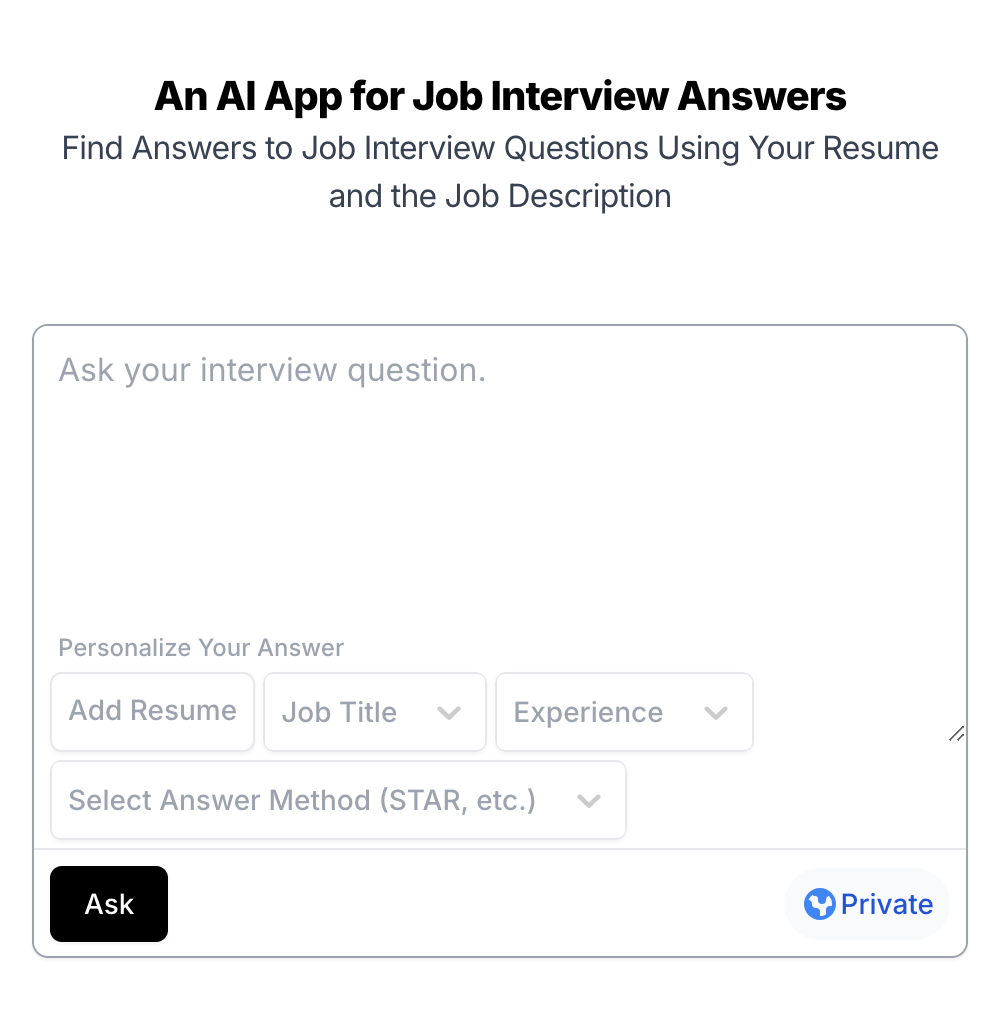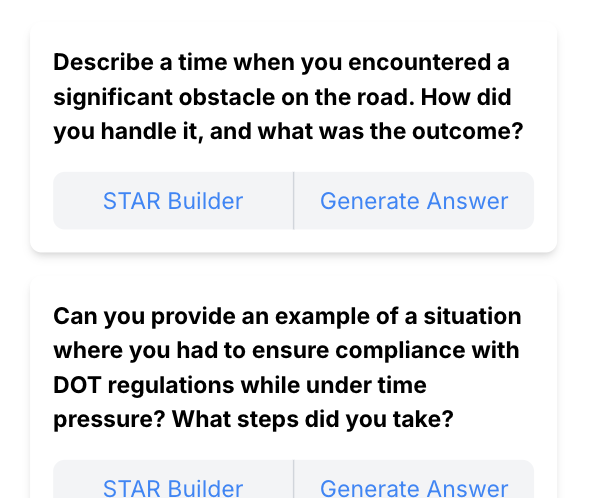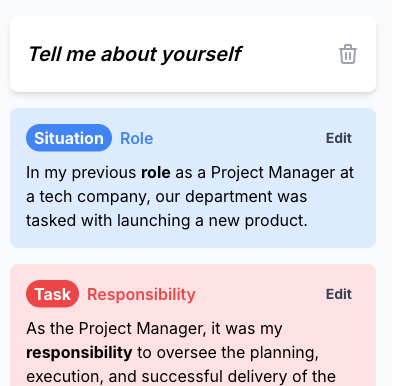
What is a Behavioral Interview Question? A Simple Guide
Fri Aug 23 2024•Author: InterviewPro AI
Table of Contents
- What Does It Mean?
- Common Behavioral Interview Questions
- How Long Should Your Answer Be?
- What Not to Say in Your Answer
- What Could They Ask You Next?
- Possible Follow-Up Questions
- When Are These Questions Asked?
- Who Asks This Question?
- How Important Are These Questions?
- Tips for Answering Behavioral Questions
- How to Structure Your Answer
What Does It Mean?
Behavioral questions ask about your past experiences and how you handled specific situations. The employer wants to measure your ability to work in corporate environment, team rules, problem-solving skills, and how you handle stress. They're looking for examples of your behavior in the workplace to predict how you might act in the future and if you're a good fit for the job and team.
5 Common Behavioral Interview Questions
- Tell me about a time you faced a challenge at work.
- Describe a situation where you had to work in a team.
- Give an example of when you showed leadership skills.
- How did you handle a disagreement with a coworker?
- Tell me about a time you made a mistake and how you dealt with it.
How Long Should Your Answer Be?
Aim for about 1-2 minutes per answer. This gives you enough time to explain the situation and your actions without going on too long. Your answer will be used to generate follow-up questions, plan your answers and keep them short and relevant.
What Not to Say in Your Answer
Avoid certain types of responses when answering behavioral interview questions. Here are some things you shouldn't say, along with examples:
-
Don't be vague or general
- Bad example: "I always work hard and get along with everyone."
- Why it's bad: This doesn't provide any specific information or examples.
-
Don't badmouth others
- Bad example: "My last boss was terrible and didn't know how to manage people."
- Why it's bad: Speaking negatively about your previous employer or colleagues makes you look negative and unprofessional.
-
Don't over exaggerate
- A Bad example: "I single-handedly saved the company millions of dollars."
- Why it's bad: Don't say things that will cause the interviewer question your credibility.
-
Don't give irrelevant information
- A Bad example: "Well, it all started when I was in high school..." (for a question about a recent work situation)
- Why it's bad: This wastes time and doesn't answer the question.
-
Don't say "I don't know" or "I've never experienced that"
- Bad example: "I've never had to deal with a difficult coworker."
- Why it's bad: This suggests a lack of experience or inability to think on your feet.
-
Don't focus only on what others did
- Bad example: "My team worked really hard and solved the problem."
- Why it's bad: The interviewer wants to know about your specific actions and contributions.
-
Don't use inappropriate humor or be too casual
- Bad example: "Man, that project was a total disaster! We were all running around like headless chickens!"
- Why it's bad: This can make you seem unprofessional or like you don't take your work seriously.
Remember, the key is to provide specific, relevant examples that highlight your skills and experiences in a positive, professional manner.
What Could They Ask You Next?
After you answer a behavioral question, the interviewer might want to know more about certain parts of your story. They could ask about:
-
The outcome: They might want to know more about how things turned out.
- Follow up example: "What was the long-term impact of your decision?"
-
Your feelings: They could ask how you felt during or after the situation.
- Follow up example: "How did you feel when you faced that challenge?"
-
Other people involved: They might ask about how others reacted or were affected.
- Follow up example: "How did your team respond to your approach?"
-
Your learning: They could ask what you learned from the experience.
- Follow up example: "What did you learn from this situation that you've applied since?"
-
Alternative approaches: They might ask what you'd do differently now.
- Follow up example: "Looking back, would you handle the situation differently today?"
-
Specific details: They could ask for more information about a particular part of your answer.
- Follow up example: "Can you tell me more about how you came up with that solution?"
5 Possible Follow-Up Questions
- "How did that experience change your approach to similar situations?"
- "What would you do differently if you faced that situation again?"
- "Can you give me more details about [specific part of your answer]?"
- "How did your actions impact your team or the company?"
- "What was the biggest lesson you learned from that experience?"
When Are These Questions Asked?
Here are some of the points during the interview process where you might encounter behavioral questions:
-
Initial Phone Screening: Some basic behavioral questions might be asked to get a general sense of your experiences.
- Example: "Can you tell me about a time when you had to meet a tight deadline?"
-
First Round Interview: This is where you'll likely face most behavioral questions. They often come after some introductory questions about your background.
- Example: "Describe a situation where you had to work with a difficult team member. How did you handle it?"
-
Second or Final Interviews: You might get more in-depth behavioral questions here, often related to specific job responsibilities.
- Example: "Tell me about a time when you had to make a difficult decision with limited information. What was your approach?"
-
Panel Interviews: Each panel member might ask different behavioral questions to assess various aspects of your experience.
- Example: "Can you share an experience where you had to persuade someone to see things from your perspective?"
-
Assessment Centers: In group exercises, you might be observed on how you behave in simulated work situations.
- Example: "In this group task, we'll be looking at how you collaborate with others to solve a problem. Please walk us through your thought process as you work."
There's no fixed rule. Some interviewers might start with behavioral questions, while others might save them for later in the conversation.
Who Asks This Question?
-
HR Representatives:
- Example: "Tell me about a time when you had to adapt to a significant change at work."
-
Hiring Managers:
- Example: "Can you describe a project you led that didn't go as planned? How did you handle it?"
-
Team Leaders:
- Example: "Give me an example of how you've contributed to building a positive team environment in the past."
-
Potential Colleagues:
- Example: "Tell us about a time when you had to explain a complex technical concept to a non-technical person."
-
Senior Management:
- Example: "Describe a situation where you had to make an unpopular decision. How did you handle the aftermath?"
-
External Recruiters:
- Example: "Can you share an experience where you went above and beyond your job responsibilities?"
The person asking the question often tailors it to their specific concerns about the role. For example, an HR rep might ask about general workplace behavior, while a technical manager might ask about how you've handled specific work-related challenges in the past.
How Important Are These Questions?
These questions are used as ice breakers, small talk and get to know you better. They provide information about your past behavior and how you might act in the future. Employers use them to assess your skills, experience, and fit for the job. They want to hear corporate values, problem-solving skills, and how you handle stress.
Tips for Answering Behavioral Questions
- Prepare stories from your past experiences
- Be specific and use real examples
- Focus on your actions and decisions
- Explain the positive outcomes
- Practice your answers before the interview
How to Structure Your Answer for Behavioral Questions
Use the STAR method to structure your answers:
- Situation: Describe the context
- Task: Explain what you needed to do
- Action: Detail the steps you took
- Result: Share the outcome of your actions
Behavioral questions are a chance to show off your skills and experiences. Turn these questions into opportunities to shine in your interview. Your answer will be used to generate follow-up questions, plan your answers and keep them short and relevant.
Can't find what you're looking for?
Try our AI-Powered Interview Preparation Tools
Prepare for your job interview with our AI tools. Tailored answers, custom questions, and STAR method responses.


